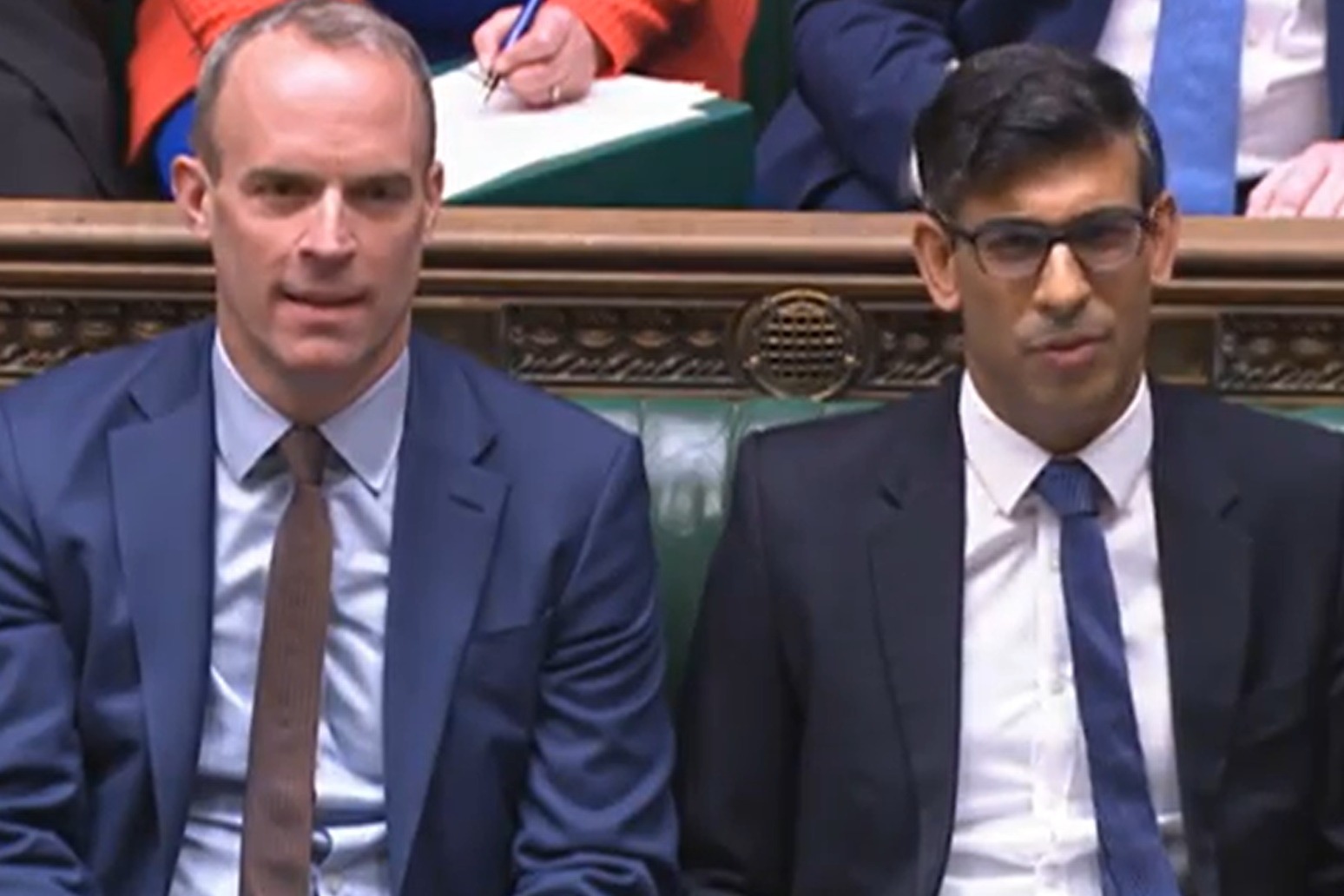
The Deputy Prime Minister says he promised to step down if the findings showed any bullying whatsoever
Deputy Prime Minister Dominic Raab has quit Rishi Sunak’s Cabinet following the conclusion of an inquiry into bullying allegations.
Mr Sunak received the report from senior lawyer Adam Tolley KC’s investigation on Thursday and had been considering the findings since.
In a resignation letter to the Prime Minister, the Deputy Prime Minister said: “I am writing to resign from your government, following receipt of the report arising from the inquiry conducted by Adam Tolley KC.
“I called for the inquiry and undertook to resign, if it made any finding of bullying whatsoever. I believe it is important to keep my word.
“It has been a privilege to serve you as Deputy Prime Minister, Justice Secretary and Lord Chancellor.
“I am grateful to have had the opportunity to work as a minister in a range of roles and departments since 2015, and pay tribute to the many outstanding civil servants with whom I have worked.
“Whilst I feel duty-bound to accept the outcome of the inquiry, it dismissed all but two of the claims levelled against me.
“I also believe that its two adverse findings are flawed and set a dangerous precedent for the conduct of good government.”
The full inquiry has not yet been published by Downing Street, but Mr Raab in his resignation warned that the probe’s findings would have damaging consequences for Government.
The MP for Esher and Walton said he was “genuinely sorry for any unintended stress or offence that any officials felt, as a result of the pace, standards and challenge that I brought to the Ministry of Justice”.
But he added: “That is, however, what the public expect of ministers working on their behalf.”
He wrote: “Whilst I feel duty-bound to accept the outcome of the inquiry, it dismissed all but two of the claims levelled against me. I also believe that its two adverse findings are flawed and set a dangerous precedent for the conduct of good government.
“First, ministers must be able to exercise direct oversight with respect to senior officials over critical negotiations conducted on behalf of the British people, otherwise the democratic and constitutional principle of ministerial responsibility will be lost.
“Second, ministers must be able to give direct critical feedback on briefings and submissions to senior officials, in order to set the standards and drive the reform the public expect of us.
“Of course, this must be done within reasonable bounds. Mr Tolley concluded that I had not once, in four-and-a-half years, sworn or shouted at anyone, let alone thrown anything or otherwise physically intimidated anyone, nor intentionally sought to belittle anyone.”
Mr Raab warns that “setting the threshold for bullying so low, this inquiry has set a dangerous precedent”.
“It will encourage spurious complaints against ministers, and have a chilling effect on those driving change on behalf of your Government — and ultimately the British people.”
The Tory MP also complained to Mr Sunak about what he said was a “number of improprieties that came to light during the course of this inquiry”.
He called for an independent review into the “systematic leaking of skewed and fabricated claims to the media in breach of the rules of the inquiry and the Civil Service Code of Conduct, and the coercive removal by a senior official of dedicated Private Secretaries from my Ministry of Justice Private Office, in October of last year”.
He also told Mr Sunak that he remained fully supportive of him and the government.
“You have proved a great Prime Minister in very challenging times, and you can count on my support from the backbenches.”
The eight complaints against Mr Raab were believed to centre on his behaviour as foreign secretary, Brexit secretary and during his first stint as justice secretary.
His exit as Deputy Prime Minister and Justice Secretary leaves a major gap in Mr Sunak’s Cabinet, with speculation about who will replace the loyal Sunak backer.
Mr Raab’s resignation comes months after the Prime Minister moved to sack Nadhim Zahawi as Conservative Party chair amid controversy over his tax affairs, while Sir Gavin Williamson – another Sunak backer – resigned only days into his premiership after it was alleged he sent expletive-laden messages to a former chief whip.
Published: by Radio NewsHub









